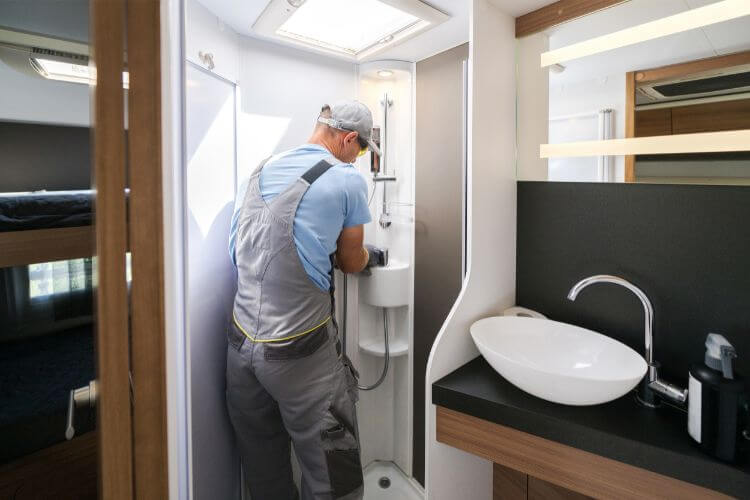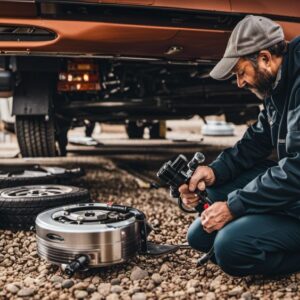A motorhome habitation check is an essential inspection that ensures the safety and functionality of your motorhome’s living area. This examination is carried out by a specialist engineer who examines all the systems and components of the living area of your motorhome, campervan or caravan.
The habitation check is a series of checks that tests all the systems to ensure they are in good working order.
During a habitation check, the specialist engineer will examine the motorhome’s gas, water, and electrical systems. They will check the gas appliances, including the cooker, fridge, and heating system, to ensure they are working efficiently and safely.
The water system, including the taps, shower, and toilet, will also be checked for any leaks or damage. The electrical system will be tested to ensure it is safe and functioning correctly, including the battery and charging system.
Additionally, a habitation check includes testing fire and CO detectors to make sure they are in good working order. If a motorhome is equipped with fire extinguishers, these will also be checked to ensure they are in good condition and functioning correctly.
A habitation check is an important safety measure that ensures your motorhome is safe to live in and that all systems are working correctly.
What is a Motorhome Habitation Check?
A motorhome habitation check is a thorough inspection of the living area of your motorhome, campervan or caravan. It is designed to ensure that the vehicle is safe and fit for habitation.
The check is usually carried out by a qualified technician and consists of a series of tests and inspections to ensure that all the systems in your motorhome are working correctly.
The habitation check focuses on the interior of the motorhome and includes a range of checks to ensure that everything is in good working order. This includes checking the electrical systems, gas appliances, water systems, and the overall condition of the living area.
The technician will also check for any signs of damp or water damage, which can be a common problem in motorhomes.
During the habitation check, the technician will use a checklist to ensure that everything is checked thoroughly. The checklist will include items such as checking the condition of the upholstery, testing the smoke and carbon monoxide detectors, and checking the condition of the windows and doors.
The technician will also check the condition of the exterior of the motorhome, including the bodywork and the condition of the tyres.
It is important to have a habitation check carried out on your motorhome on a regular basis to ensure that it is safe and fit for habitation. Most manufacturers recommend having a habitation check carried out every year, although this can vary depending on the age and condition of your motorhome.
By having a regular habitation check, you can identify any potential problems early and ensure that your motorhome is safe and comfortable to use.
Why is a Motorhome Habitation Check Important?

A motorhome habitation check is crucial for ensuring the safety and functionality of your recreational vehicle. Regular habitation checks can help detect and prevent potential problems before they become more serious and expensive to fix.
Here are some of the key reasons why a motorhome habitation check is important:
- Safety: A motorhome habitation check can help identify any safety issues within the living area of your vehicle, such as gas leaks, faulty electrical wiring, or carbon monoxide leaks. These issues can pose serious risks to your health and safety if left unchecked, so it’s important to address them as soon as possible.
- Functionality: A habitation check can also help ensure that all the systems within your motorhome are working properly, including the water, heating, and electrical systems. This can help prevent breakdowns and malfunctions while you’re on the road, and ensure that you have a comfortable and enjoyable trip.
- Compliance: Depending on your insurance policy and the regulations in your area, you may be required to have regular habitation checks to maintain compliance. Failing to comply with these requirements can result in fines or even the revocation of your insurance coverage.
Overall, a motorhome habitation check is a small investment that can pay off in a big way. By ensuring the safety and functionality of your vehicle, you can enjoy your travels with peace of mind, knowing that you and your loved ones are protected.
What is Included in a Motorhome Habitation Check?
A motorhome habitation check is a comprehensive inspection of the living area of your motorhome or caravan. It is designed to ensure that all the systems and components within the habitation area are in good working order and that the vehicle is safe and fit for purpose.
The exact items that are checked during a habitation check can vary depending on the specific vehicle and the service provider.
However, some common items that are typically included in a motorhome habitation check are:
- Gas system: The gas system is checked to ensure that there are no leaks and that all appliances are working correctly.
- Electrical system: The electrical system is checked to ensure that all components are in good working order and that there are no unsafe conditions.
- Water system: The water system is checked to ensure that there are no leaks, and that all components are in good working order.
- Heating system: The heating system is checked to ensure that it is working correctly and that there are no unsafe conditions.
- Ventilation and dampness: The habitation area is checked for any signs of dampness or mould, and the ventilation system is checked to ensure that it is working correctly.
- Fire safety: Fire safety equipment is checked to ensure that it is in good working order and that there are no unsafe conditions.
- Windows and doors: All windows and doors are checked to ensure that they are in good working order and that there are no unsafe conditions.
Overall, a motorhome habitation check is a crucial part of maintaining your vehicle and ensuring that it is safe and fit for purpose.
By having regular habitation checks, you can identify and address any issues before they become more significant problems, ensuring that you can enjoy your motorhome or caravan with peace of mind.
How Often Should You Have a Motorhome Habitation Check?

A motorhome habitation check is an essential part of owning a motorhome or camper. It is important to get your vehicle checked regularly to ensure that it is safe to use and that all the systems are working correctly. But how often should you have a habitation check done?
According to most motorhome experts, it is recommended to have a habitation check done once a year. This will help to maintain safety, warranty and value.
It is important to note that some manufacturers may require more frequent checks, so it is always best to check your owner’s manual for specific recommendations.
During a habitation check, a specialist motorhome and caravan engineer will inspect the habitation area of your vehicle, including the living area, kitchen, bathroom, and bedroom.
They will check all the systems and appliances, including the gas, water, and electrical systems, as well as the heating and ventilation systems. They will also check for any signs of damp or water ingress, which can cause serious damage to your vehicle if left unchecked.
It is also worth noting that if you use your motorhome or camper frequently or for extended periods, you may want to consider having more frequent checks done. This will help to ensure that your vehicle is always in top condition and ready for your next adventure.



